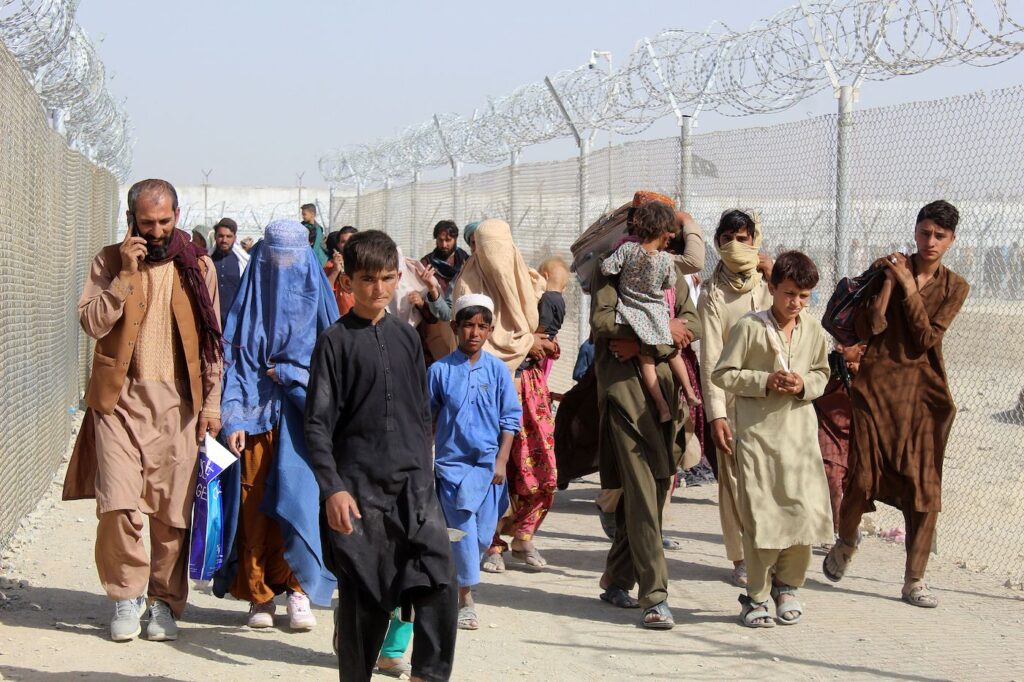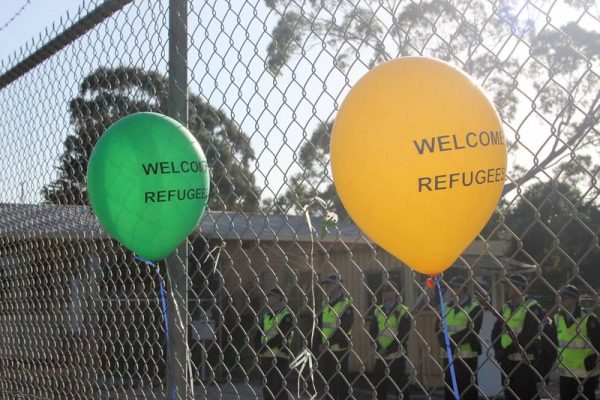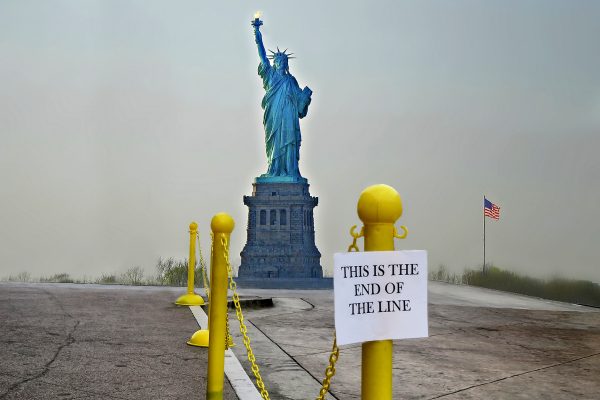The fall of Kabul comes on the anniversary of the United Nations Convention Relating to the Status of Refugees, signed seventy years ago in Geneva in July 1951. As thousands make the unknowably difficult decision to leave their homes and to seek safety elsewhere, the Convention’s moral and political meaning carries great consequence. As with any anniversary, we must consider this meaning in fresh light, with eyes turned to the world as we today find it.
The Convention guarantees international protection to those who have a “well-founded fear” of returning home. But the commitment of states to that guarantee is a fragile, often fleeting affair. The harrowing events in Afghanistan are painfully instructive. French President Emmanuel Macron, while expressing solidarity with Afghans, immediately added that Europe must protect itself against “major irregular migratory flows.” The leader of Germany’s Christian Democrats tweeted that Germany must not repeat the events of 2015, when the country opened its borders to Syrian refugees. The pledge of many countries—Canada, the United Kingdom, and the United States among them—to resettle tens of thousands of Afghan refugees is laudable, but it is hardly adequate to the need or to the depth of responsibility. Since the start of this year, more than half a million Afghans, mostly women and children, have been internally displaced, added to the almost three million displaced in 2020. More than two million Afghans are already refugees in neighboring countries.
Honoring the Convention’s promise today requires appraising the ethical vision—and ethical dilemmas—at its heart. What do we owe those who flee the risk of harm in Afghanistan—or disasters in Haiti, or civil strife in West Africa? What does answering this question in good faith demand of us? And what does it teach us about the role of refugee law in building a better world?
The Convention gives form to a humanitarian ideal, defining refugee status and specifying protected categories of persecution due to reasons of race, religion, nationality, membership of a particular social group, or political opinion. (The United States, for its part, signed the 1967 Protocol to the Refugee Convention, and, in the Refugee Act of 1980 aimed to bring its domestic law into alignment with that humanitarian ideal.) But this ideal is not an absolute guarantee; and it makes certain accommodations to limit the obligations of its signatory states.
The definition of refugee, for example, exempts war criminals and those who have committed serious non-political crimes. The Convention’s provision on non-refoulement—which holds that no refugee, even those not yet given formal status by a state, can be returned to a place where they will be harmed—permits derogation where states reasonably perceive threats to national security and public order. At the same time, states may rely on exemptions only with individualized due process, and, in cases where a refugee would suffer torture and other severe violations of human dignity, courts have interpreted non-refoulement to indeed be absolute and to permit no derogation.
As a result, the Convention harbors many structural tensions: between the sovereignty of states and the rights of individuals, between the specter of fear and threat and the promise of courage and commitment, between the calculation of benefits and costs and the inviolability of human personhood.
Scholars have offered various ways to clarify the nature of the humanitarian obligations the Convention asserts. But if the end of the war in Afghanistan should teach the United States and its allies humility about their conduct of foreign policy, one lesson ought to be the need to reflect more carefully on our claim to humanitarianism. How we justify our commitments to refugee protection matters deeply for how robust they are and how faithfully they respond to the needs of those who suffer. We should be wary, in particular, that appeals to humanitarian intent conceal latent interests that are far from universal—that are in fact partial and might reproduce consequential inequalities elsewhere. It matters that we are not misled by our conception of humanity.
Consider first the most general moral claim for humanitarian protection of refugees: that we have a universal duty to rescue. This duty is owed, as political theorist Sarah Song has written, to all in need, when we are able to assist and it is not significantly costly to do so. This claim holds up as its guiding image that of the Good Samaritan who leaps into a pond to save a drowning child. Yet the seemingly universal character of this image masks uncertainties about its interpretation. Who is to judge the quality of need, the ability to save, and the significance of the cost? From which particular perspective, and how?
Refugee law has answered this dilemma by prescribing categories of recognized persecution and expecting those seeking asylum to produce proof of it. This standard imposes on refugees and receiving states alike the burden of scrutinizing and corroborating claims to legal protection. It results in administrative protocols, burdens of proof and evidentiary standards, assessments of credibility, and inter-agency security screenings. However much these bureaucratic measures may demonstrate prudence and aim to realize the Convention’s principles, they give rise to the problem of paternalism. The state is centered as the site where universal standards are upheld, holding priority over the claims an individual might make upon them. Refugees must prove themselves worthy to that authority—an authority they have not elected—through an often inscrutable process over which they have little influence.
It is unsurprising that in our conception of humanitarian duty the image of the drowning child features so prominently. Judged honestly, in what sense do we understand the child to have standing of their own that could challenge our estimation of whether we are, in fact, able to assist at no significant cost to us?
The concern with paternalism is first a question of equality between those who provide humanitarian aid and those who are aided. This is a familiar dilemma in international human rights and humanitarian law. We encounter it, for example, in the West’s enduring fantasy of costless intervention. However understandable it might be to limit one’s exposure to risk, predicating aid on incurring no significant “costs” has always posed something of a quandary for the nature of humanitarian war. Paul Kahn, writing in 1999 about NATO’s bombing campaign in Serbia and Kosovo, asked how, if we aim to bear no cost, we can credibly consider ourselves equal to those whose suffering we hope to end. In what sense can we understand our intervention as truly humanitarian—in the interests of humanity itself—at all?
Our humanitarian image of asylum, too, exhibits this tension. The desperate scenes from Kabul force a sober admission. While aid is offered, it is not done on the basis of equality. Afghan lives simply matter less in our conception of the world, and no amount of humanitarian language can make up for it. If this elicits shame or embarrassment, it is due to a conflict deep within our values.
This tension turns, too, on the question of agency: who is empowered to wield it and who must bear its effects. In the interpretation of the Convention’s standards (“well-founded fear” or “persecution”), the humanitarian assessment is shot through at each stage with judgments about the seriousness of harm and the deservingness of protection. It is thereby tied to the volatile production of knowledge of what counts as harm, where the threshold for moral and legal recognition remains an empirical characteristic to be demonstrated and verified.
Didier Fassin, for one, has explored these problems in his critique of humanitarian reason and its effect on the personhood of refugees and migrants. Fassin describes a regime of “biolegitimacy” that compels those who suffer to provide evidence of their suffering, to provide testimony of the body, “hopefully sufficiently injured to establish the truth of their persecution.” Here, asylum procedures and public policies admit callous, often highly misguided forms of calculation—a trading of sorts with pain, deservingness, and human life.
Notably, for example, the Convention does not recognize extreme poverty and material deprivation as grounds for asylum. This generates the politically manipulated distinction between deserving refugees and undeserving economic migrants. Upon closer inspection, such a distinction tends to break down, of course. Dire economic circumstances can be just as life-threatening as state persecution and, further, they can be intimately tied to other social and political forms of vulnerability that may ultimately force people to flee their homes. While creative lawyering by refugee advocates has pushed the bounds of protections to include those fleeing persecution on the basis of their sexual orientation and gender or due to gang violence, the claim of economic deprivation remains legally spurious.
In short, refugee law faces a stark challenge. The desire to categorize our humanitarian obligations too often can mislead us into prejudgments that deny the agency and equal personhood of those we wish to help. They can betray a caustic desire for control, which risks undermining the responsiveness of our obligations to the contemporary global human condition, that is to say, our humanitarianism.
In this desire for control lies a recurring danger that we apprehend life only as what philosopher Giorgio Agamben has called “bare life”—a material condition to be managed rather than a subject to be empowered. Refugees resettled to the United States through the work of UN High Commissioner for Refugees (UNHCR), for example, are subjected to data collection by the UNHCR itself that is then further run through databases at the National Counterterrorism Center, the U.S. Departments of Homeland Security, State and Defense, the FBI, and Interpol. Refugees thus risk being condemned to a permanent state of exception—as recipients of charity, a social and financial burden to be minimized, or, further still, as a potential threat, always subject to surveillance and inspection.
This is what scholars mean when they say we increasingly “securitize” our debates on refugee protection. We tend to lose a fair sense of where the burdens and risks of security should be distributed and, indeed, of whose security counts at all. In the name of humanitarianism, we become skeptical of suffering. We scrutinize another’s harm to verify that it is, in our view, authentic and truly merits taking the risk (and bearing the cost) of protection. That assessment of risk rests too easily as our own prerogative—bureaucratic, byzantine, and virtually impossible to challenge by those we subject to it.
In recent years, as planning for the withdrawal of U.S. armed forces from Afghanistan began, the humanitarian obligations of the United States to some refugees have been justified on narrower, if seemingly firmer grounds: in terms of obligations we have to specific Afghans who have served alongside our soldiers and diplomats. In acknowledgment of that service and the reprisals they will likely suffer, we ground this obligation not on their humanity but on shared sacrifice. It is a moral obligation borne of a particular politics, not altogether different than the one we might feel to our own soldiers whom we seek to bring home.
But here again there is play in the joints of our reasoning, for why believe that our duties end with those Afghans who served alongside the war effort in this way? Do we not owe a similar political obligation to those who have had their lives essentially affected by U.S. intervention, which is to say all Afghans? Do we require Afghan applicants to show employer referrals and predicate their asylum eligibility on their length of employment and the nature of their jobs? Or does the scope of political obligation extend farther still? If the Allied nation-building project encouraged all Afghans to take risks in participating in a nascent civil society and to defend the rights of women and minorities, do we feel responsible for the harms such activity might now bring them, any and all of them? Where do we find the limits of a violent, pervasive, twenty-year involvement in the affairs of others? How far and how deep do we understand our mutual entanglements with Afghan society to run and thus our responsibilities for Afghans to extend?
International refugee law struggles with questions of this sort. Today conflicts subject individuals to violence that is often untargeted, widespread, random, and indiscriminate. Yet those who flee such violence can seldom seek protection under the 1951 Convention’s refugee definition, which is predicated upon individualized—and thus discriminating—persecution. In response, commitments to varieties of “complementary protection” for those fleeing more generalized forms of violence have been advanced regionally and by individual states, although many such protections are often more discretionary, impose higher burdens of proof, and offer weaker procedural and substantive safeguards than those provided to Convention refugees. As Kabul falls and the violence affecting Afghan society changes, these distinctions can hardly be more consequential.
The uncertainties and inconsistencies that mar our decisions about whom to protect tell us something about the broader task of refugee law. What if we began from a different, more radical formulation of ethical responsibility? To acknowledge another life as the source of an ethical obligation is not, I think, to examine empirical descriptions in order to see whether it measures up to some predetermined depiction of a life worth saving. Instead, it must begin with an acknowledgment of the unknowability of that person’s interior world, a sense of incomprehension of the other’s being—of all the other must have gone through, what we can scarcely imagine, and what inspires an sense of unfulfillable responsibility, rather than a desire for mastery and assessments of risk and calculation.
This is the view of philosopher Emmanuel Levinas, who intended no less than to rework philosophy from the ground up, pitching ethics as first philosophy, so that we would never deny the infinite value of another’s life. What if refugee law would ask us similarly to rework the way we thought through our engagement with others and the responsibility we have for them? What if refugee law inspired us to reorient our basic frames of reference for law and global politics?
Doing so would require at least two kinds of reorientation.
The first should aim to reform existing asylum policies and legal doctrines. Here, with Levinas in mind, we should resist thinking of ourselves as entitled to impose on others simplistic criteria for protection without building in, as much as we can, demanding forms of self-criticism and reflection. An unfulfilled promise of the 1951 Convention is to question more critically those state prerogatives by which obligations to others are judged.
This might mean that we adopt greater flexibility in the refugee definition’s grounds for protection—in light of changing causes of human vulnerability that force migration. Climate change and severe economic deprivation today are far too consequential for refugee law to ignore. It might require establishing humanitarian corridors that guarantee safe passage, supported by private sponsorships, for recipients of humanitarian visas, like those opened in recent years to Syrian and Eritrean refugees by Italy, France, and Belgium. The presumption that refugees must undertake arduous journeys across land and sea, where they endure myriad dangers, is mistaken and cruel. We should resist it.
Further, acknowledging that our judgments of need and desert are liable to distortion and bias, this reorientation might demand greater care in designing the legal process for adjudicating asylum so that it safeguards the agency and equal standing of applicants. For example, in the United States, in addition to securing federally guaranteed legal assistance, we should reconsider adversarial proceedings for asylum cases in U.S. immigration courts. As Stephen Paskey argues, far from fairly or efficiently pursuing the truth, adversarial hearings are inherently ill-suited to assess the credibility of asylum applicants who flee traumatic events. Adversarial proceedings, which include aggressive cross-examination by government lawyers, tend to fragment the integrity of the account a refugee can give, fail to comprehend how trauma might inform discrepancies in their story, and thus hinder a responsive judgment on the merits of their claim to protection. We should end such practices and afford asylum applicants the respect and consideration of a non-adversarial hearing.
Or consider the concept of a “safe third country,” according to which we may forcibly return asylum seekers, without full scrutiny of their claims, to third countries if those states are believed safe. This rule permeates not only the asylum regime but also various migration management systems of states across Europe and North America, including border control and readmission policies. It was the cornerstone of the Trump Administration’s so-called Migrant Protection Protocols that are again being implemented and require asylum seekers to remain in Mexico while they wait for their cases to be heard; and it underlies recurring negotiations for bilateral asylum readmission agreements between the United States and Mexico, Guatemala, El Salvador, and Honduras. The concept’s impact on access to asylum cannot be overstated. Its essential role is to push individuals in need ever farther away and to shift responsibilities unfairly onto other countries. It has done immense harm and should be rejected as immoral and unlawful.
But we can take these lines of thinking farther still. Revisiting our obligations under the Convention can yet speak to a more robust vision of global justice in a second, more foundational reorientation. Levinas’s vision of ethics suggests that the lives of others are constitutive of our own. It is not merely that others matter to us, but that our relationship with the other precedes us. We do not enter the world as self-possessed liberal subjects, already fitted with the rational tools to choose what we owe to others. Instead, we are free—capable of making judgments and decisions we value—only through responding to others. Self and other must not be understood in isolation.
These reflections find footing in the material and geopolitical analysis of postcolonial theory. Acknowledging neocolonial relations breaks with the conceit of an international legal order of formally independent, autonomous nation-states, each with the provisional right to exclude non-nationals. This conceit naturalizes the nation-state’s political foundations by forgetting the history of empires grounded in colonial exploitation and its contemporary implications. Like Levinas’s ethical theory, the postcolonial critique corrects this perspective. It asserts its own concern for the prior relationships of interconnection that set the conditions in which we act: where first world powers rely on extractive relationships with formerly colonized states in order to secure the conditions for their own freedom—and in turn continue to limit the freedom that is possible for others. We might be strangers but, as Tendayi Achiume writes, we are emphatically not “political strangers.” Our collective lives are constituted in tandem. Any account of international legal responsibility that begins from ignorance of this relationship is bound to reproduce inequality and cannot, on its own terms, succeed.
The full ethical demand of the right to seek asylum promises to correct this distortion in how we perceive our place in the world among others. Mari Matsuda has called “the actual experience, history, culture, and intellectual tradition of people of color in America” a critical “epistemological source”; the same is true of the testimony of refugees for the states who receive them. Robust, institutionalized responsiveness to that testimony promises to attune states to the particular international distribution of benefits, burdens, and vulnerabilities that unjustly expose some societies more than others to conflict or state failure. If we listen to their stories closely, it impossible to miss that the suffering refugees flee is embedded in systemic failings, drivers of inequality and misery: not only structures of oppression, xenophobia, and abuse of state power but struggles against the exploitation of labor in global supply chains, the fight for affordable generic drugs, vast inequities in the exploitation of natural resources, and the production of planet-destroying waste. The rights of refugees are not only corrective or protective or remedial for the individual applicant, although they are those things. They also reveal the terms of enduring relationships of power and our entanglement within them.
Such awareness suggests new remedies to the systemic causes of global injustice—and casts doubt on others. The typical situation of today’s refugees is far more complex than state-sponsored oppression, a frame that historically has undergirded militarism against “rogue states.” In militarism’s place, we would do well to focus on progressive international accords in the fields of labor, drug patents, arms proliferation, and the environment. Amidst the present pandemic, we would ramp up delivery of vaccines and medical supplies. The less we force refugees to fill pre-established categories of harm and the more open we are to faithfully understanding the reasons they flee, the more we will pursue an imaginative range of policy instruments to address root causes of forced displacement and migration.
To be sure, the protection of refugee rights is not the only way we can assess systemic injustice globally. But it is a powerful and profound way, and it is a way that far better respects the agency and standing of refugees than a framework of compassion or care alone. Our duties under refugee law are not exhausted by those protections given by the powerful to the powerless. They require us to take responsibility for the unjust structure of that power itself—and to make a commitment to transform it.
In these duties there is also the germ of remedy for a broader deficit in the political culture of the West today: our carefully manufactured ignorance of the suffering of the vulnerable, whether near or far. We should not close our eyes to this suffering, to our implications in it and our responsibilities for it. Seventy years after the agreement that offered protection to the displaced, living up to its promise will require far more ambitious commitments to reimagine and remake a common world.








